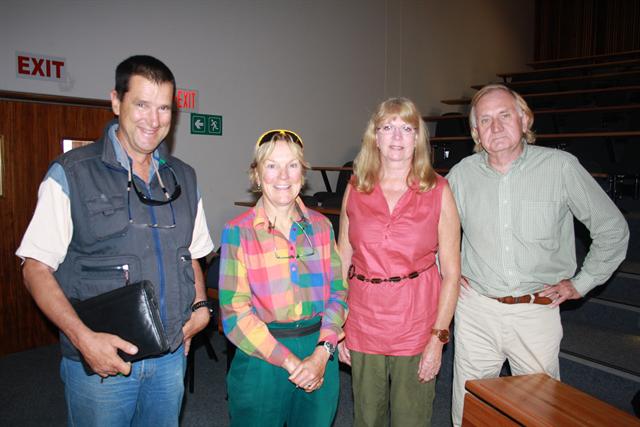This was the opening statement of Prof. Christo Fabricius, NMMU George Campus principal, in his provocative public lecture at NMMU last week entitled 'A time for choice: stewardship of the Garden Route'.
Referring to the strategist Clem Sunter's latest future scenario update for South Africa to the effect that the country "is staring over the edge of a cliff", Fabricius sent out the same warning for the Garden Route. He said that the region is about to cross a number of very important thresholds from which there is no return.
These crossings will lead to a 'regime shift' not only on an ecological level, but also in the social and economic sphere. "I am afraid that shift will not be a positive one and the current generation is possibly the last that can do something to prevent it.
"To avoid a chaotic future, he urged that "we need to adopt wise strategies and do wise, wise, wise things. It is time for choosing."
Expanding on the topic of planning and developing strategies for the future, he said it is something that happens in an uncertain environment and outcomes are often thwarted by unpredictable factors such as governmental policies, population growth and immigration, natural disasters and the world economy. But there are factors that can be controlled locally and this enables communities to influence their own future.
In the Garden Route's scenario, these "controllables" include the management of ecosystems, local economic development, as well as local policies, strategies and practices, and on these levels our region needs wise and decisive action now.
Fabricius called for local policy reforms, but at the same time questioned whether long-term decisions and planning can be left to the politicians, many of whom have proved themselves not to be responsible and accountable citizens. He identified a huge lack in proper project management, which results in the implementation of strategies and plans often falling by the wayside. "We must train hundreds, if not thousands, of project managers. This is the biggest single investment needed to get things on the high road. I hope for the day when we stop making plans and start implementing."
Bureaucracy and red tape must be reduced where possible and feasible and public private partnerships should be exploited.
He furthermore warned that our failing education system needs drastic improvement and the wealth gap must be closed to promote unity in the community. "As long as we have a large wealth gap – and it is growing – we have another threshold where the tipping point will be reached."
Ecology worth billions
Most important of all are the ecological systems of the Garden Route, and they are nearing a tipping point too. Extensive investment in repairing the region's ecological infrastructure and excellent eco-management on provincial and local level are paramount. "Our ecological infrastructure is worth billions and we are not managing it. It is our most valuable asset in the Garden Route."
Fabricius concluded that, although society has to make peace with the fact that multiple possible futures have to be considered and that an exact outcome cannot be predicted, it is in the power of the residents of the Garden Route, as its stewards, to do something.
"Let us not be put off by the 'uncontrollables', but let us focus on what we can do. It can put us on a different trajectory."
He said that the NMMU will admit accountability and play its role in pushing back from the cliff. Hopefully, other role-players will take up the challenge too.

Keen to hear what Prof. Christo Fabricius had to say were (from left) Danie Smit, Suz Phillips (NMMU) and Wilderness residents Joyce and Bob Hopkin.
ARTICLE AND PHOTOS: ALIDA DE BEER, GEORGE HERALD JOURNALIST
















